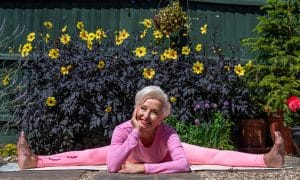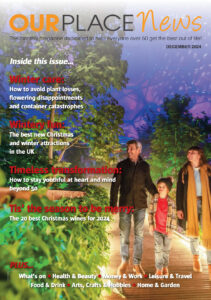After decades in hairdressing, 65-year-old Sharon McAllister was ready for a change rather than a rest. And her yoga classes are just the beginning. And at 70 Erik Wilkinson went camping for the first time – and stopped cocooning himself from life.

When Sharon McAllister’s daughter trained as a yoga teacher, she raved about it so much that McAllister herself was tempted. She had spent decades as a hairdresser, but this year, at the age of 65, she joined four strangers on an intensive, 250-hour yoga-teaching course in Spain.
“I thought: ‘What do I want to do with the rest of my life? What have I got to offer? Am I just going to be another invisible old lady, or can I be of some use?’” She has already led 10 classes as a cover teacher where she lives in Essex. Her instructor told her: “You have your own individual skills to bring.”
While she is still developing her personal style of teaching, she has noticed that the way she ends her classes is very popular – with an assisted savasana, or corpse pose, in which she offers a postural adjustment of her class-goers’ feet, arms, heads, necks and shoulders. “I’m used to touching people from my hairdressing career. It feels natural, something I’ve got to offer people, exchanging energies through touch.”
It was McAllister’s father who suggested hairdressing as a career when she was a child. Himself a barber, he had been trained by his father. A family photo shows McAllister’s grandfather in the family salon in the 1920s.
As a child, McAllister “was always patted on the head rather patronisingly by adults and told: ‘I expect you will go into the family business.’ Through gritted teeth, I would smile at them and think: ‘No I bloody won’t!’ But I did. And I was very grateful for it.”
While completing a degree in fashion and textile design, McAllister realised that it wasn’t the path for her. “I wanted to branch out on my own,” she says. She asked her dad to train her and, at 22, with £1,000, she opened her own salon, Buddies.
“It was the 70s. Vidal Sassoon was my idol. I had done my dissertation on him. I had delusions of grandeur, in the small town of Brightlingsea,” she says.
She wore her hair in a short pixie cut, coloured to a strawberry blond, and she decorated the salon in cream and brown, put cork tiles on the walls, and spider plants in macramé hangers. “It went down incredibly well. There were no unisex hairdressers around at the time. It was quite revolutionary.” McAllister loved to go to London. “Colouring courses, advanced styling… In those days, you could sign up and go to the Wella school, or Vidal Sassoon.” When her dad retired, she took over his salon, then acquired a third.
Her brother was a competition hairdresser, and won the world championships in the 70s. McAllister “was more concerned about keeping people happy in my locality. It’s been such a privilege to have been a hairdresser all my life. You meet the most amazing people. You have the most fabulous conversations.” However, three salons proved overwhelming. She let two leases lapse. Then in 2008, she broke her arm in a fall. “I couldn’t hold a comb, couldn’t hold scissors. I had to close the salon for three months. That’s a long time in haircuts.” When she returned, she was 53. “It was a different world. I was starting again. And I found that my age went against me. People expect women in hairdressing to be younger. And I wanted to do other things with my life.”
As well as the yoga, those “other things” have included a course to learn plant-based cookery. Next she wants to study sound therapy. She may yet run retreats. “I could do the food as well. As you grow in confidence, you think: ‘I could take this a bit further.’ “I like to think when I’ve finished a yoga class that people go out feeling happy and contented and pleased and relaxed,” she continues. “Those are the same feelings I wanted people to leave my salon with. In return, I’ve been able to keep my brain active, my body supple. Physically, emotionally, mentally and psychologically, it’s been amazing.” As she says of those hairdressing courses decades ago: “It is all about the journey of learning.”
His tent has blown down, midges have forced him to sleep in a van, but after decades of planning and preparation, Erik Wilkinson is embracing the unexpected.
Erik Wilkinson’s 70th birthday hit him with great force. He celebrated, but cannot remember the occasion. However, a phrase entered his head. “Pregnancy of death,” he says. “The words sprang into me. I thought: ‘I don’t know how long I’ve got.’ And this phrase kept coming to mind.” It began to dominate his thoughts. “Like any pregnancy, you need certain inputs. Because you are going through a transition,” he says.
This is how, at 70, Wilkinson decided it was time for his first experience of camping. A thinker and a planner – he says he is often described as a thoughtful tactician – he took preparation seriously. He and his wife, Norah, put up a tent in the garden. During lockdown, they slept out for the first time.
“Our tent opened Norah and me to strange rustles of animals, the flutter of moths and the gentle hues of the sky… and the tent stayed up!” Did Wilkinson want to camp as a child? “Not at all!” he says. “The thought was awful. It was too challenging.” In cubs and scouts, he declined all invitations. “I wonder why,” he muses. Maybe he liked to know how things would pan out in advance? “Probably. Yes.”
Wilkinson spent most of his working life, from his late 20s to 55, in the National Careers Service, which is ironic, given that he didn’t really know what to do. He was looking for security after two years travelling – itself an attempt “to break the whole thing about lower-middle-class kid goes to university, comes out and goes into a bank”. He set up a self-funding assessment centre in Wiltshire, which used psychometric testing to provide careers advice. In a sense, at 72, he is now advising himself on his own best way forward.
After the night in the garden, Wilkinson continued his camping apprenticeship with Norah in Stroud, then in Carmarthenshire. He saw other campers’ fires, and bought a fold-up brazier. He adapted his Citroën Berlingo to take a camp bed. Then, in June, after they had visited family in Scotland, Norah caught the train home to Gloucestershire and Wilkinson set off on his first big solo adventure – “10 days on my own around the north of Scotland”.
He slept out in the van by the sea on his first night, after midges drove him from the campsite. But that was great, he says. “It’s the things that go wrong, the problem-solving, the people you meet, that take you out of your comfort zone. It’s not cocooning you from life.” Another night, a gale blew down his tent in Durness – and that was fine, too. “That’s there as a memory. It’s shifting it from ‘This is awful’ to ‘This is an adventure’. That’s the journey I’m trying to do.” Maybe he is trying to effect the same shift on hitting his 70s.
Camping, or adventure, is only one aspect of Wilkinson’s “pregnancy” preparations. The phrase being so suggestive, I wonder if he and Norah have children, but Wilkinson says they chose not to and “it’s not been a big deal”. He lists other “pillars” of this gestation as practical (getting a will in order, accepting death, developing intergenerational relationships), but say there is a spiritual element, too.
Wilkinson says that all his life he has worked too hard. Even volunteering for local climate groups in retirement came to feel like a job. As he talks about his “pillars”, this “pregnancy” that may extend to decades sounds as if it has activated his work ethic, albeit in a liberating way. “I’m very in my head,” he says. “That’s why the camping is so good.” It chimes with his experience after university. “What I wanted to do was to travel,” he says. He went to India and Israel. “And that was the best thing I ever did.” Not least because he met Norah on a kibbutz.
There are times, especially while having breakfast at his campfire, or sitting there in the evening, between eight and 10 as the light fades, enjoying “that meditative aspect” of the flames, that he really appreciates camping – “for giving me a way to be as healthy and positive as I possibly can be for the people I love”.
(Article source: The Guardian)

